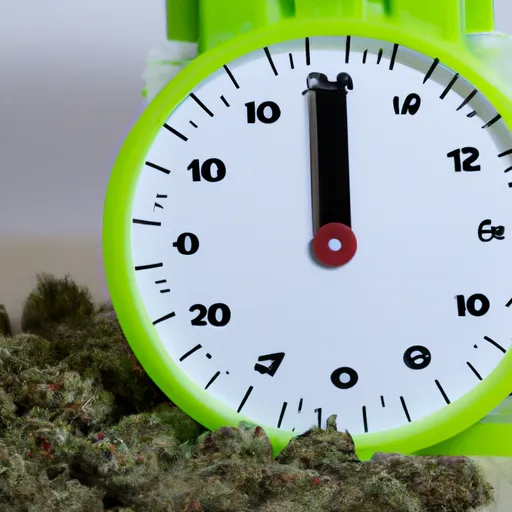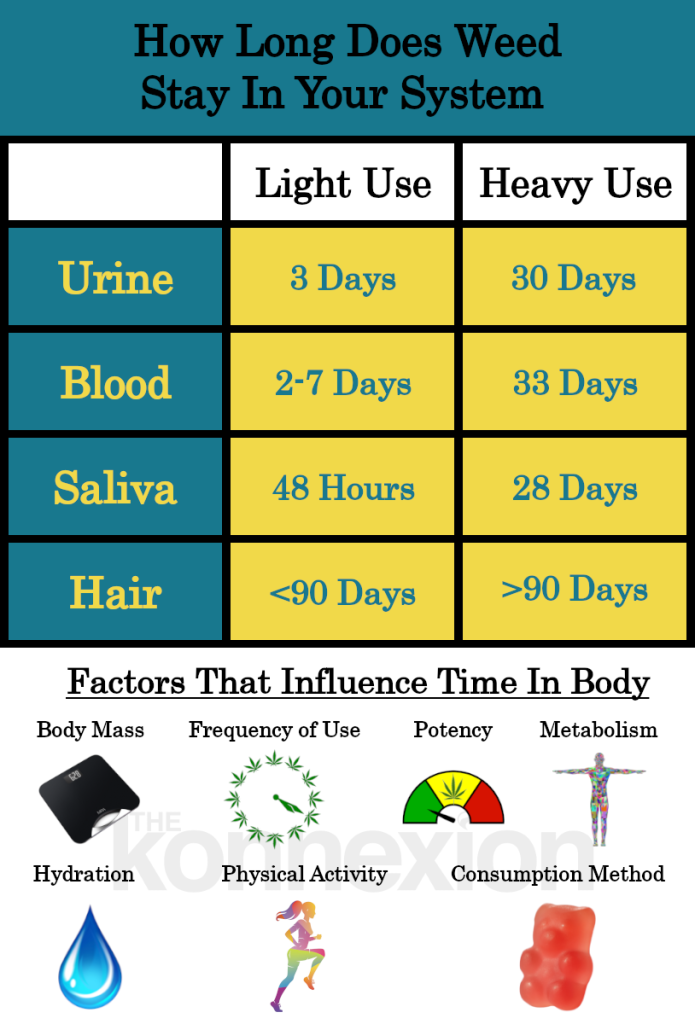Iowa City (319) 321-6401 |

Brunei Kratom: A Comprehensive Guide to Effects and Dosage
Imagine navigating the dense rainforests of Brunei, uncovering the hidden

Weed has become increasingly popular over the years, and more people than ever are curious about how long THC stays in their system. To answer this question, let’s look at the case of John, a 25-year-old man from San Francisco who recently experienced an unexpected drug test after accepting a new job offer. After smoking weed days before his test, he wondered if it would appear on the results – and sure enough, it did!
This brings us to our key question: How long does THC stay in your system? The length of THC in one’s body can vary greatly depending on age, weight, frequency of use, and metabolism rate. To help you understand the science behind this phenomenon better, we will explore what influences marijuana detection times.
Whether you’re like John or just want to know for educational purposes only – read on!
Don’t Get Caught! Learn How Long Delta 10 Stays Detectable in Your System
Table of Contents:
Timeframes for THC detection can vary based on many factors, such as the frequency of use, the individual’s metabolism, the amount of cannabis taken, the mode of ingestion, and the testing technique. THC metabolism speed is affected by age, body mass index, and other personal characteristics.
THC can be found in various body locations for differing amounts of time. Various methods of THC detection, such as urine, hair, blood, and saliva tests, can be used to detect THC in a person’s system. Following is a summary of the THC detection windows in each bodily region:
For up to 2-7 days following consumption, THC can still be found in the blood. Heavy cannabis use, on the other hand, can still be detected up to 33 days after abstinence.
Saliva: Up to 48 hours after consumption, THC can still be found in saliva. Heavy cannabis usage can lengthen the detection window by a few weeks.
Depending on how often and how much cannabis is consumed, THC-COOH, the major metabolite of THC, can be found in the urine for many 1-30 days. Frequent cannabis users can test positive for THC in the urine for up to several weeks following use. This is compared to occasional users, who may test positive for up to a week.
Hair: Depending on the hair length examined, THC and its metabolites can be found in hair up to 90 days after use.
It is crucial to remember that these detection windows are only estimations and may change depending on factors that affect THC metabolism. The following part will discuss the various aspects and how THC is metabolized.

It is possible to fail a drug test due to secondhand smoke, but the likelihood depends on several conditions.
If you are exposed to a large amount of secondhand smoke in an enclosed space, such as a car or a room with people smoking around you, it is possible that you could test positive for marijuana or other drugs in a drug test.
But, the amount of secondhand smoke you are exposed to must be substantial, and the drug test must be performed within a less than 6 hours of your exposure. The amount of THC (the active ingredient in marijuana) absorbed from secondhand smoke is generally minimal.
Also, the drug test sensitivity would be considered. Some drug tests are more sensitive than others, detecting even trace amounts of THC in a person’s system. The test sensitive would need to be lower than 20 µg/L THC to test positive.
To summarize, while it is possible to fail a drug test due to secondhand smoke, it is uncommon. The chances of this occurring depend on various factors, including the amount of smoke you were exposed to and the sensitivity of the drug test.
Tetrahydrocannabinol (THC) metabolism is a complex process that varies significantly among individuals. When THC is consumed, it is absorbed and distributed throughout the body after consumption.
THC is processed in the liver through oxidation. When ingested, THC enters the bloodstream and travels to the liver. There, it is converted into various metabolites, such as 11-OH-THC and THC-COOH. THC’s half-life in the bloodstream ranges from 1 to 10 days; however, its metabolites can stay present for extended periods. The body expels these compounds through urine and feces.
Those who use marijuana chronically tend to have higher concentrations of THC metabolites in their blood than occasional users since they don’t eliminate them as quickly.
Ultimately, it’s imperative to consider all these factors when determining how long THC will remain detectable in an individual’s system.
Mind-Blowing Revelation: Delta 9 vs Delta 10 – Which Will Take You Higher?
The endocannabinoid system is a complex web of interactions that affect how quickly THC is metabolized in the body. To understand this process better, it’s worthwhile to consider the following factors:
All these elements must be considered when estimating how long THC will stay in your system. Ultimately, everyone’s experience is unique and varies according to individual characteristics and lifestyle habits.
Various conditions can considerably alter the time it takes for THC to leave the body, but overall, THC removal occurs naturally and cannot be significantly accelerated. The following advice could speed up THC removal from the body.
Physical activity and proper hydration are the most effective ways to speed up THC clearance. Exercise increases circulation throughout your body, flushing out toxins faster. Additionally, drinking plenty of water ensures that all bodily systems work optimally to avoid chemical breakdowns or waste disposal processes.
Making dietary changes can also affect how long THC stays in your system. Eating a healthy diet with plenty of fiber-rich foods helps cleanse the body faster than only eating processed foods high in sugar and sodium.
Sweating can help remove toxins, including THC. Spending time in a sauna or hot bath can increase sweating and aid in body detoxification.
Furthermore, certain medications may interact negatively with cannabis compounds and cause them to remain longer than usual; therefore, it’s wise to speak with a medical professional about potential drug interactions before consuming marijuana products.
Finally, getting adequate restful sleep each night helps support general well-being while promoting efficient detoxification processes within the body – making it increasingly likely for cannabinoids such as THC to leave your system sooner rather than later.
It’s crucial to remember that none of these techniques can ensure total or quick THC removal from the body. Moreover, some methods, like drinking too much water, can be harmful and result in water intoxication.
People utilize a variety of “detox” or detoxification treatments to speed up the removal of toxins from their bodies, including THC. It’s crucial to remember that there is no surefire way to hasten the body’s regular elimination of THC. Detoxification techniques may not always work. The following are some of the most popular detoxification techniques:
Understanding how long THC stays in the system is essential, as it can affect one’s health and lifestyle. Knowing this information allows individuals to make appropriate decisions about cannabis consumption.
THC metabolism depends on several factors that vary from person to person. Some people can clear THC from their systems faster than others by utilizing detox methods such as abstaining from marijuana or using certain supplements.
Additionally, getting plenty of exercise, drinking lots of water, and eating nutritious foods can all speed up the clearance process.
Ultimately, understanding THC’s duration in our bodies is essential for making informed choices regarding its use. Whether you are an occasional user or consume more regularly, staying aware of your body’s metabolic rates will ensure that you remain safe and healthy as you partake in these activities.

Imagine navigating the dense rainforests of Brunei, uncovering the hidden

Have you ever wondered why Trainwreck Kratom has sparked such

To effectively combat headaches, specific Kratom strains stand out for
Subscribe for exclusive deals and updates!
